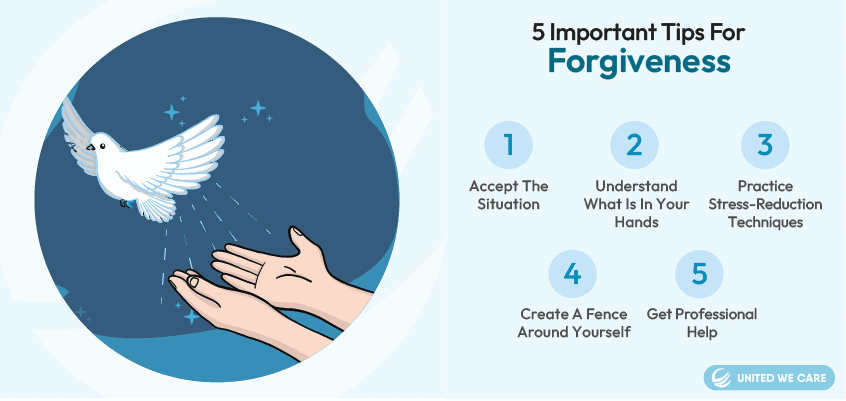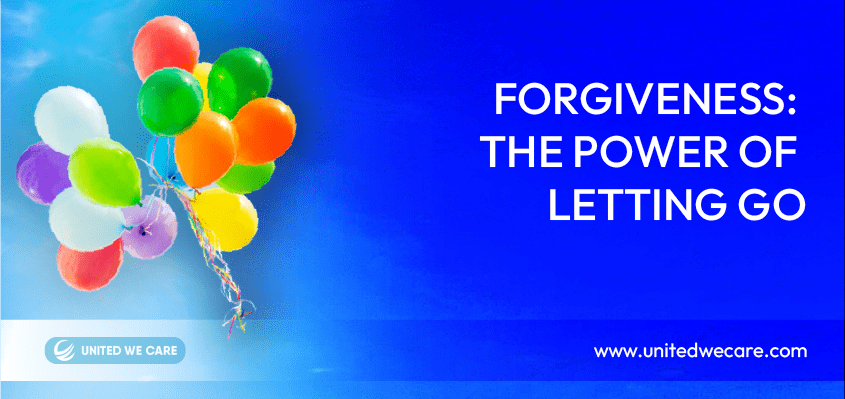Introduction
Growing up, we have all heard that we should learn to forgive people around us. Some of us do that quickly, and some of us take time.
I remember a boss who fired me for a mistake that could be corrected. Now, I had two options there – either I kept the whole situation with me and held grudges against him, or I could just forgive him and get peace of mind. While he did not forgive, I did.
Forgiveness can mean different things to different people. However, it is the decision to allow yourself to let go of the people or situations that hurt you.
“There is no love without forgiveness, and there is no forgiveness without love.” -Bryant H. McGill [1]
Importance of Forgiveness
We, as human beings, will always make mistakes. Some mistakes can be small, like telling a lie about homework to your parents or faking being sick to avoid going to school or work. Other mistakes can be big, like rash driving leading to the death of someone.
Let me share a story from the Hindu scripture recited by Lord Krishna to His disciple, Arjuna.
Once, a saint was sitting in a pond to bathe. He noticed a scorpion in the water, just on the verge of drowning. Without giving it any thought, the saint attempted to save the scorpion. Now, a scorpion has a natural instinct to sting if he feels there’s danger. So, that is what the scorpion did; he stung the saint. The saint was determined to help the scorpion and ignored its stings. He kept trying and getting stung till he saved the scorpion. After getting stung so many times, it would have been hard for the saint to forgive the scorpion, but he still did [2].
Forgiveness does not mean forgetting or justifying what happened. It does not even mean that you have to keep a relationship going. Forgiveness is for you so that you can be at peace with yourself and the situation.
Forgiveness can lead to [3]:
- Improved relationships with lesser chances of conflicts
- Better mental health: fewer symptoms of depression, less anxiety, stress, and hostility
- Better physical health and immunity: decreased hypertension and cholesterol and better heart conditions
- Improved self-esteem and confidence
- Better ability to trust
- Greater spiritual beliefs
Read more about-The Guilt Trap or Feeling Guilty Trap
Understanding Unconditional Forgiveness
Forgiveness can be conditional and unconditional. When we forgive conditionally, we expect the person who made the mistake never to repeat it or show regret. But unconditional forgiveness is absolutely different [4].
Unconditional forgiveness is when you forgive someone without any limitations or expectations. You allow yourself to let go completely. Unconditional forgiveness means that you choose to forgive irrespective of what a person has done, the amount of harm caused, or how apologetic they are. For example, you might have seen family members of someone who died in an accident forgive the person who caused the accident.
To be able to forgive unconditionally takes a huge amount of empathy, compassion, strength, courage, self-work, spiritual knowledge and power, and consistent practice [4].
However, unconditional forgiveness does not mean that you allow a person to harm you or disrespect you constantly. Remember to set boundaries for yourself to protect yourself from further hurt while you continue to choose forgiveness.
Read more about — how to respectfully ignore someone
5 Important Tips for Forgiveness
Spiritually, I learned one of the biggest lessons. We will always get hurt by people, as they will make mistakes and maybe even betray our trust. Forgiveness is not easy and requires a lot of time, strength, and practice. Nevertheless, we must forgive them, not for them but for ourselves [5] [6]:

- Accept the Situation: Acceptance is everything. When we accept something, we are able to think more clearly. In order to accept, you must know exactly what happened, acknowledge your feelings, and understand why you are feeling a particular emotion. Take your time while you process everything, but remember not to suppress any emotions as they may come back multifold. Acceptance does not mean that the mistake was not a problem; you’re just taking time to reflect and putting yourself in the other person’s shoes to understand from all perspectives.
- Understand What is in Your Hands: If someone makes a mistake, ask yourself if there is anything you can do to correct the situation. If yes, then do that. If not, then in any case, there is no point in taking things to hear. It is important to focus on solutions and the present rather than problems. Remember to be patient with yourself in the process.
- Practice Stress-Reduction Techniques: If you are in a situation where someone says something, the best thing to do is to concentrate on your breaths. Observing the flow of breath, taking deep breaths, and practicing mindfulness and meditation can help you to become more objective and focus on what is important.
- Create a Fence around Yourself: It is important to set some boundaries after you were hurt to protect yourself from any further harm. Let the person who did you wrong know that you would want to take time to process everything. You can also learn to detach yourself in the process. Nobody should have so much power over you that they are able to hurt you.
- Get Professional Help: Some situations or events hurt us too much for us to become objective and deal with them on our own. You can seek help from a mental health professional. United We Care is a platform that can help you in the journey of forgiveness.
Conclusion
Forgiveness has the power to empower us and make us feel immense peace of mind. It is a gift that can help us move toward healing, growth, and a brighter future. To do that, it is important to accept the situation, look at what we can do, be compassionate, and detach ourselves.
If you want help regarding forgiveness, you can reach out to our expert counselors or explore more content at United We Care! At United We Care, a team of wellness and mental health experts will guide you with the best methods for well-being.
References
[1]“A quote by Bryant McGill,” Quote by Bryant H. McGill: “There is no love without forgiveness, and there…” https://www.goodreads.com/quotes/543823-there-is-no-love-without-forgiveness-and-there-is-no
[2] “Forgiveness, that is fatal,” Times of India Blog, Apr. 17, 2022. https://timesofindia.indiatimes.com/readersblog/ajayamitabhsumanspeaks/forgiveness-that-is-fatal-42602/
[3] “Why is it so easy to hold a grudge?,” Mayo Clinic, Nov. 22, 2022. https://www.mayoclinic.org/healthy-lifestyle/adult-health/in-depth/forgiveness/art-20047692
[4] “Is Forgiveness Conditional or Unconditional? | Tim Challies,” Tim Challies, Feb. 15, 2008. https://www.challies.com/articles/is-forgiveness-conditional-or-unconditional/
[5] T. Bennett et al., “5 Steps to Forgiveness | Thriveworks,” Thriveworks, Aug. 20, 2017. https://thriveworks.com/blog/5-steps-to-forgiveness/
[6] S. magazine, “8 Tips for Forgiving Someone Who Hurt You,” 8 Tips for Forgiving Someone Who Hurt You | STANFORD magazine. https://stanfordmag.org/contents/8-tips-for-forgiving-someone-who-hurt-you










